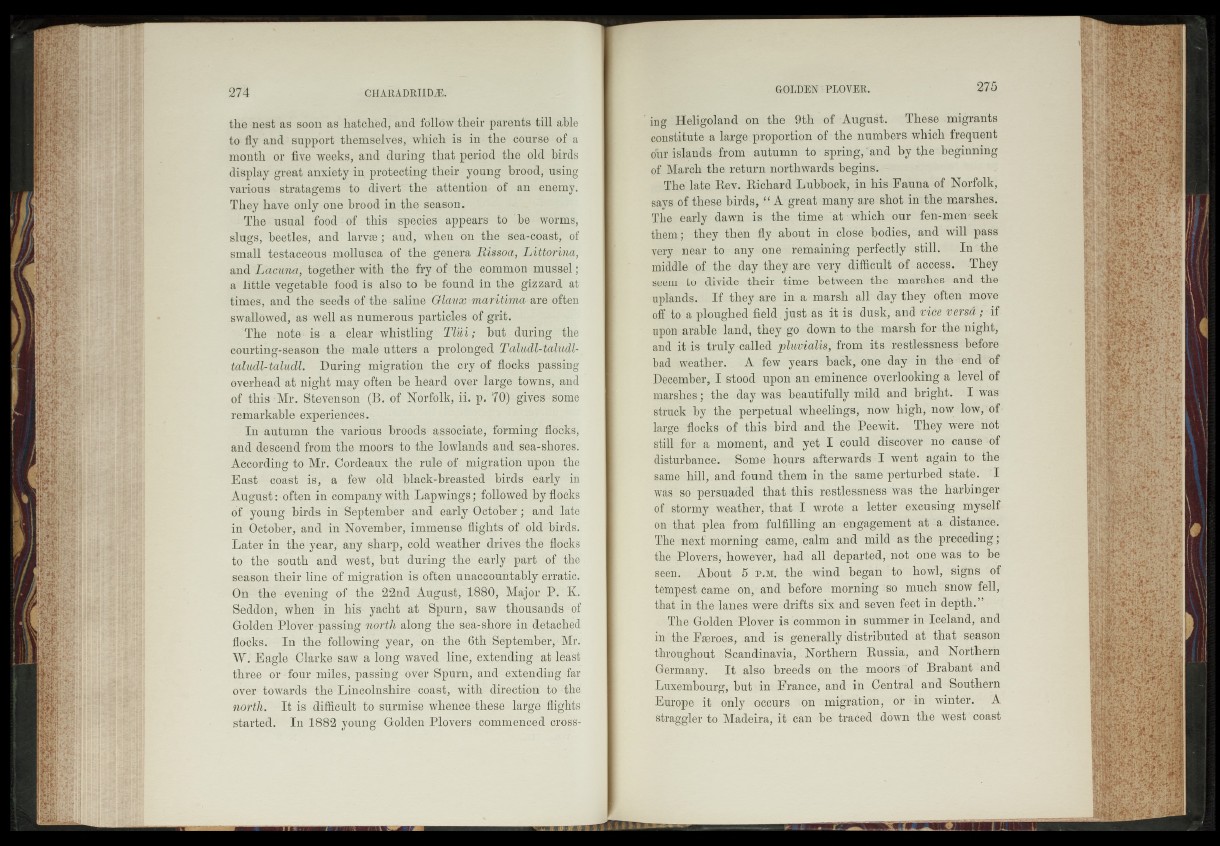
the nest as soon as hatched, and follow their parents till-able
to>fly and; support themselves, which is ip.* the course of a
month or fife weeks, and during that period the old birds
display great anxiety in. protecting their young brood, using
various stratagems to divert‘“th"e "attention* of an enemy.
They have Only one brood in the season.
The-usual food-of this ' species appears to be-worms,
slugs, beetles,' and larvae; and, when on the sea-coast; of
small testaceous - mollusca of!the, genera1'Rissoa, Ij$$orina,
and Lacuna, together with-the fry of the' common mussel;
a little vegetable food is also to be found ih the gizzard at
times, and the seeds of'the-saline maritime^'are often
swallowed,'as-well as numerous-particles--of grit;
' The note- is- a eleAr whistling- TlMih but d-iriftgSsthe
eourting-season the male utters ja prolonged Talndi-tkfiidl-
tdludl-taludl. During migration the e#y of flocks -passing
overhead’at night may often be heard over large-towns,*^and
of 44118 ’Mr. Stevenson-(B. of Norfolk, ii. p. 70)'--giv%-:^bme
remarkable experiences.1
In autumn' the -various ' broods .associate, forming*-fibeks,
and descend from the moors to the lowlands and sea-shores.
According to':Mr. Cordeaux the rule of migration upom-the
East" coast is, a ‘few- old black-breasted - birds eiirly'iii
Augustoften in' company with-Lap wings yfol^wbd 'by flbfeks
of - young- birds- §J||Septe'&ber and early OetSber ; an delate
•ih-Oetob'er, and in November, immense-flights of "old "birds.
Eater in the year,* any sharp, "cold '-wlather drives fth.ee ffiocks
to th e : south and Ivest';’ but during -the' ^.a||y cpafte fof the
season their- line.of-migration■ is often unaccountablyierr-a-tic.
Oh-:tihe-evening-ofi;-the 22nd^August, 1880, 'Major P. K.
Seddbfo; when in his. yacht -at Spurn, saw - thousand^'
Golden-Plover-passing n 0 th along the -sea-shbre in detached
flAcks.' - In the- following -.year-, -on-$Mei6th. ^September^'Mr.
W.! ESgle -Clarke.'Saw a long -waved -IMe, extending^ at least
three or^four milespp assing-fovejr Sptgrn,' and* ext en ding »far-
over- ;;towards"’'th#Eihd6lh§Mre--icoa st, whh^difecti'eh db'-dhe
north. It-is difficult* to surmise'W-h^ei^thl^^-MrgeV^'gMts
started. In 1882.young' Golden Plovers commenced crossing
Heligoland on the 9th ■ of rAugiist. These-migrants
constitute a large proportion of the numbers whieh frequent
our isfands from autumn to - spring, ’and by the'-beginning
of March the. return northwards begins. -
The late Rev. Richard Lubbock,'-.in bis Fauna of Norfolk,
says- of these birds3; *“ A'great-many-are-shot in;the marshes.
The early dawn d» the time at-which our fen-meir'seek
them;--they then'fly'about in-close'’bodies, and will pass
very, pear to-any one .remaining perfectly' still. In '-the
middled©! the ■ day they ■ are ■ very: difficult of - access. 1 They
seem-to divide theim time between the marshes- and the
uplands. If they .safe in a-marsh alPday they often move
off to'a ploiigbed-field ju s t as ife^s dusk, an d ^ lS vms4';~il
upon arable- land, they :go down to the/ marsh fordbe night;'
and iftis-. truly-balled :piuvïalb, from its --restlessness before
bad- ;w;eather. .A few. years back, one day in <theiend3'óf
December, I stood upon.an enpnènce :overlooking-a'level of
marshes,; the day'was^heautifullyimild and bright.1' I'wa's
strack’-by the perpetual Swheelings;* now high,-Pow>low,-óf-
large •'flocks-of -this'foirdvanddhe ^Peewit. They were--not
sMitfor#a * moment, and yet Jseould.'discover- no' catfse^of
disturbances-rSome'hours aftérwards I wént again to 'the-
same hill, andvfound them in'the same perturbed''state. ±1
wfisdso I persuaded thaPthis restlessness-was the harbinger-
of, stormy 'wéalhèr,' that tj?.l wrote a I’fottev excusing mysélf-
on that plea »from'Vfulfilling .an-engagement' at -a distance.
The?$nëxf morning’:came, .calm and mild as the .preceding f
thevPlovefspltöwevëiv had :all departed, hot oPe -was’to he
sjeèn. About - 5-;P(.m. the .wind began to howl, signs of
tempest: .came |on, oand before morning "sh^much - snow fell,
thatdndhedahes, .were- drifts' six"and seven-feet in depth.’“ - ‘
The Golden rPlover ismommon in summer Jfedeela.nd, and
in*Vthe Faroes, .and is igenerally-distributed -at that- sea-son
throughout I Scandinavia,. Northern Russia-,1 -and N or-thëïn
Germany.' It also breeds, on the meörs^of'--.Brabant-and
Luxembourg, but1 iuKFrance,' and in Central and Southern
Europe it < onl-y/oeemrs. on:-migra-tiöh, 'orbin'-winter.- A
straggler to "Madeira,''it can he traced down--the wesirbbast